****Spoilers****
Guy de Maupassant Canoeing With Two Ladies
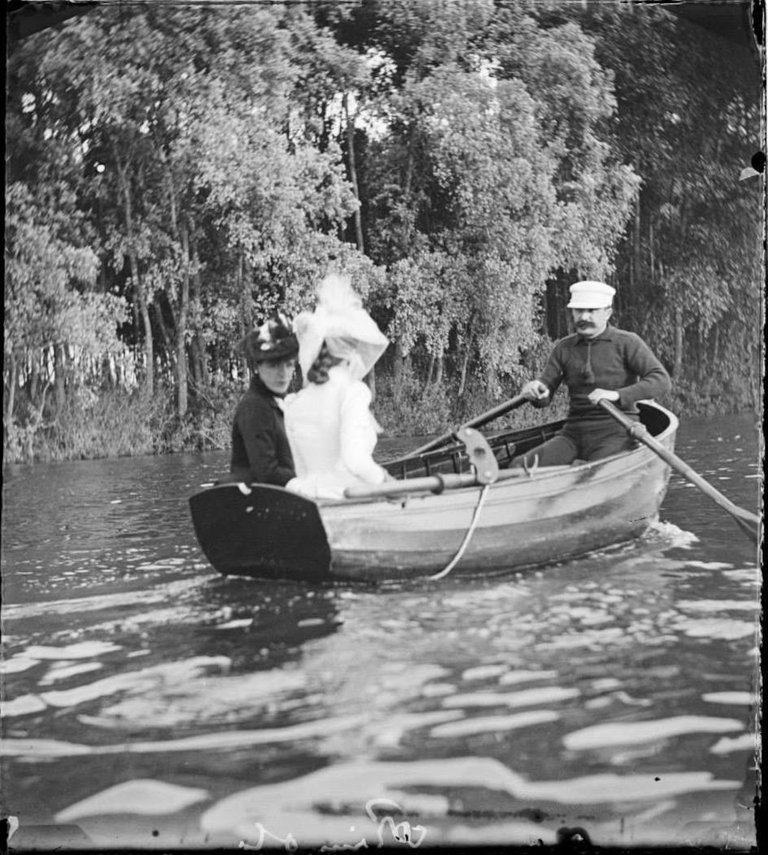
Image credit: Giuseppe Primoli.1889. Public domain
There is a scene in Guy de Maupassant's Une Vie (A Life), where the village priest, Abbé Tolbiac, beats a dog to death. Not only is the dog chained as it is pummeled into a mangled carcass, but it is also in the process of giving birth. One of the puppies is actually born after its mother has expired.
All the puppies in the litter die, save one. The puppy is adopted, and named. It's name? Massacre. Massacre reappears throughout the book. Its fortunes parallel, to some extent, the fortunes of the main character, Jeane,Vicomtesse de Lamare.
De Maupassant has an agenda. He strips off the veneer that thinly disguises the cruelty of moral hypocrisy. The dog and its puppies represent a “ perfectly pure and natural“ (page 189, Une Vie) biological function-- as natural, Maupassant writes as “apples falling from a tree” (page 189, Une Vie). The priest represents suppression of a natural function: sex. He dedicates all his energy to repressing the natural, biological impulse of people to make love.

Why is Abbé Tolbiac in an enraged state when he comes upon the dog?
Tolbaic is new to the village. He is replacing a jolly old priest who regarded sexual indiscretion with benign tolerance, and even amusement. He, the former priest, had been in the habit of arranging marriages for young girls who found themselves 'in the family way'. The villagers were fine with this. Life was peaceful and families flourished.
When Tolbaic learned about this custom, he was disgusted. “I shall soon have all that changed," (page 180, Une Vie) he announces. The new regime of intolerance alters the relationship of the church with the peasantry.
De Maupassant writes of the new Abbé (page 183, Une Vie):
Soon he was detested by the whole country-side. With no pity for his own weaknesses, he showed a violent intolerance for those of others. The thing above all others that roused his anger and indignation was—love.
Botteleurs Cauchois, 1827
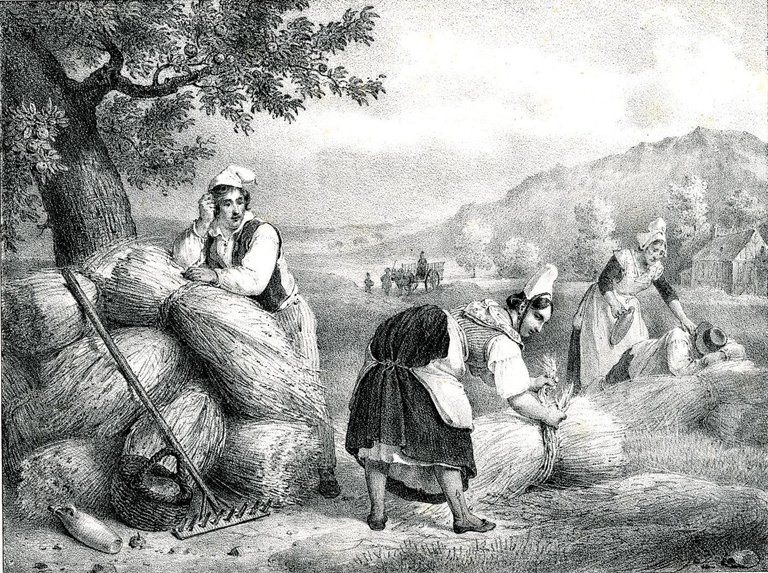
Image credit: François Grenier. Printed and published by Charles Motte. British Museum. Public domain Under the picture we find this description: "Female farm labourer in the Pays de Caux, Normandy, tying up a bundle of hay while on the left a resting labourer watches"--Perhaps the lascivious gaze of the male labourer would have disgusted Abbé Tolbiac.
On the day that he pummels the dog, it is love that has enraged Tolbiac. He has just learned that Jeanne's husband, the Vicomte de Lamare, is in an adulterous relationship with a neighbor, M. de Fourville . Tolbiac insists that Jeanne immediately expose the lovers.
“I have not the right to do so," Jeanne protests (page 188, Une Vie). She explains that M. de Fourville's husband will kill the adulterers if he finds out about them.
Tolbiac is apoplectic at her refusal. He turns to go, “....so furious that he trembled all over “ (page 189, Une Vie) It is thus that he comes upon the dog and her puppies. He vents his rage, and when he was “unable to beat the dog any longer, he jumped on her, and stamped and crushed her under-foot in a perfect frenzy of anger. “ (page 190, Une Vie)
Then Tolbiac informs M. Fourville's husband of his wife's infidelity. The husband finds the lovers together in a hut, rolls the hut off a cliff, and their bodies are found at the bottom of a ravine. Maupassant describes these bodies in much the same way that he described the battered dog: “two bruised and mangled corpses.” (page 190, Une Vie)

At the end of Une Vie, Jeanne is in mental and physical decline. Her husband is dead. Her parents are dead. Her only child has spent all her money and she is living on a modest sum in a small cottage. She observes in the last chapter of the book:
“I am like Massacre, before he died.” (page 260, Une Vie)
The Lovers at the Bottom of a Ravine
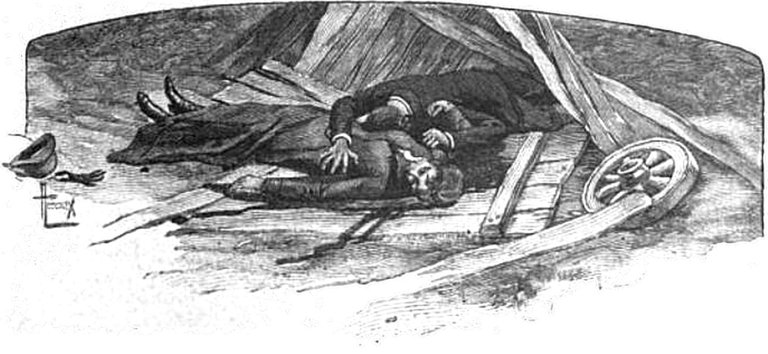
Image credit: Drawing by A. Leroux, engraving by G. Lemoine, 1883. Public domain.
The role of moral hypocrisy as an antagonist occurs in much of Guy de Maupassant's writing.
In another novel, Pierre and Jean (subtitled The Crucifixion), a destructive obsession with moral rectitude becomes the driving motivation.
The main character, Pierre suspects that his younger brother was the result of an adulterous relationship his mother had with a neighbor. Pierre imagines that gossips are whispering about this disgrace. He is tormented by the thought and by the idea of his mother's transgression.
Pierre's aversion to his mother becomes manifest in everything he does. He wants her to know. He wants her to suffer. She grows distraught, not because she regrets the affair, but because she disgusts her son.
Illustration from Pierre and Jean
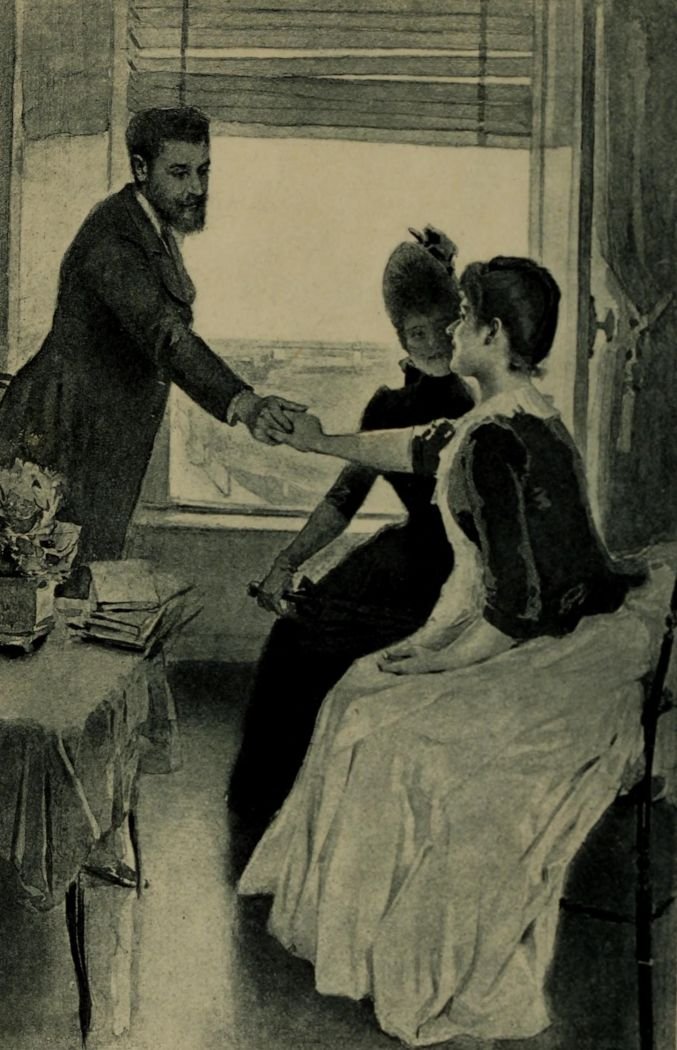
Image credit: scanned from the book Pierre et Jean by Guy de Maupassant. Published 1903. Public domain.
Pierre's obsession destroys his relationship with his family. He can no longer have peace in the home but must leave. He signs up for service on a ship, and it is suggested he may not come back for years, if ever.
A Confirmand in Normandy, 1889
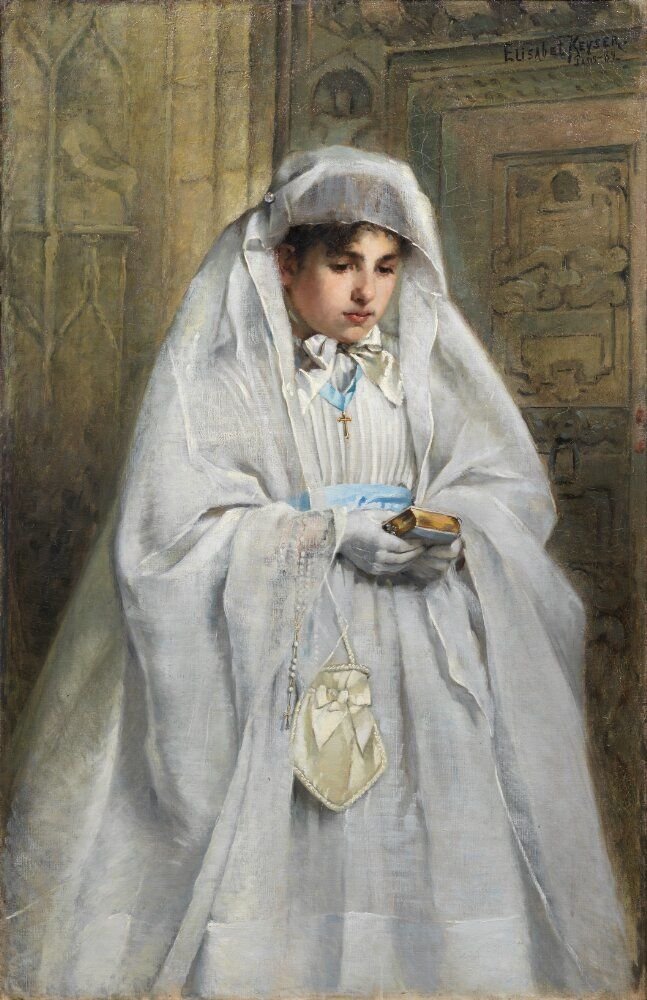
Image credit: Elisabeth Keyser, National Museum. Public domain. The white dress of the young girl represents purity, chastity.
Guy de Maupassant (August 5, 1850–July 6, 1893) is considered by many to be the best French writer of short stories, and is one of the most influential short story writers in the world. He was a protege of Gustav Flaubert, who was renowned for his precise use of language. Flaubert's best known work, of course, is Madame Bovary. The title character in this novel commits suicide because of the 'disgrace' she has brought on her family after a failed affair with an aristocrat.
Both Flaubert and Maupassant were themselves sexually adventurous. Both contracted syphilis. Both struggled with mental decline because of the disease, and both died prematurely. Maupassant suffered from syphilitic psychosis and Flaubert died of a cerebral hemorrhage.
It is said that as Maupassant wrote Une Vie, he consulted with Flaubert. There is a consistency of theme between Madame Bovary and Une Vie. Both were character-driven novels and both were books in the naturalist school.
In Madame Bovary and Une Vie, the story begins with a young woman who has an idealized, romanticized belief in love. She is eventually destroyed “... in a male-dominated society” and becomes disillusioned “with life, religion and most importantly love.”
View of the Seacoast Near Wargemont in Normandy
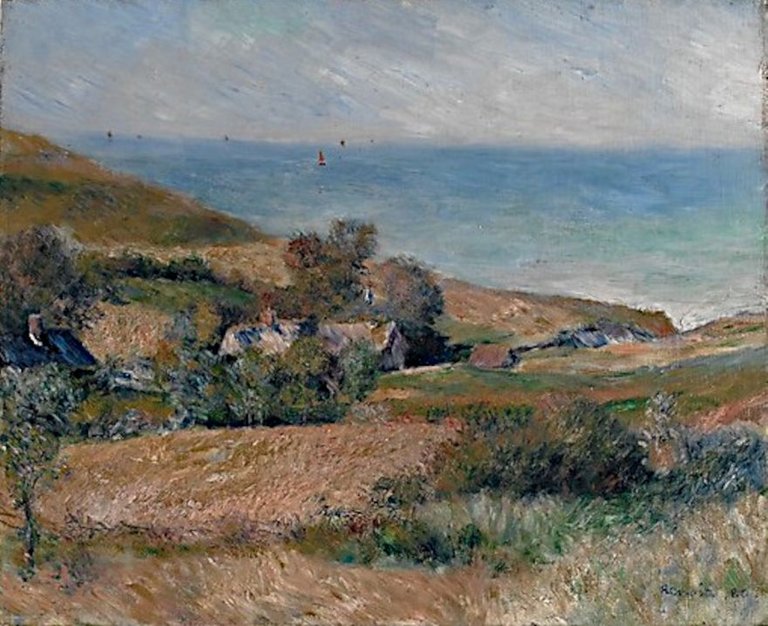
Image credit: Pierre-Auguste Renoir (1841-1919),1880. Public domain. De Maupassant grew up in Normandy. This area of France is the setting for "Une Vie" and for many of the author's works. The sea figures greatly in Une Vie. Jeanne spends hours looking at the ocean and longs for it as the book nears its conclusion.
Conclusion
I first read stories by Guy de Maupassant when I was in high school. Years later, as a young adult, I read him again. When I rediscovered de Maupassant a few weeks ago, it was a revelation. There was so much I had missed in my earlier readings. The stories are rich in meaning that the author has carefully placed there, if we care to see.

I recommend any story by Guy de Maupassant. Une Vie is an especially impressive book. It's not very long. You can buy a copy at Amazon for $8.00. (translated *A Woman's Life). Or, you can read it for free at Gutenberg Books. All books referenced here are available online at Gutenberg.
Picture not credited in the blog:
Silhouette accent, adapted from: Pixabay



It is interesting to see how attitudes have changed across the ages and across cultures. On a trip to India, I was amazed at what I saw there. No modern culture would reach that level of public openess towards intimacy. Since then, India has become less open. In the West, we have moved in the opposite direction. From prudish beginnings towards a more exploratory and experimental phase. Or so it seems to me anyway.
These writers treat social matters with a delicate subtleness that is quite poetic.
Marvelous!
Exquisite piece @agmoore.
Hi,
for my part, it made me stumble upon your sentence, that the west moved in opposite direction. While this is probably true in some sense, I am not sure if this is the case, still.
Just the other day I thought of my first stays in the United States as a German woman. I was used to to be topless at the beach, when we were young we ventured our youths and bodies. It was totally normal to do that and not only on FKK Beaches, as we called them, where people ran around, totally naked. You don't see that much, if at all, nowadays. I don't know, if it still happens in France, which is known to be more open in this regards. Even being bra-less seems to be very unusual and you get commented on that quite a lot. I know it, because I experience it. So, in California I experienced for the first time, that you are not allowed to do that. Also, drinking in public was not allowed. I was utterly perplexed by this and thought "what a backward state is this?"
Encountering further restrictions in real time only within a time window of three weeks, I felt anxious in front of the police and other security staff which you constantly ran into. That was the in the end of the 90's. I remember telling my friend, who decided to immigrate to the States, I could not do that for the very reason to feel unfree over there. I perceived over the course of many years and visits to CA that my friend and her friends appeared following orders in the public but then, behind closed doors, it got really crazy oftentimes.
One day, I was screaming in delight with a friend of mine and laughed loud out. I wanted him to catch and carry me but he told me: "No, I can't do that. People will misinterpret it and call the cops." I was so baffled and pulled down to this ground of reality that it made me angry. "Really, for being loud and funny in public, people call the cops?", was what I thought.
The only reason I felt much freer over there than here in my own country was the landscape and the sheer space between cities. Here, you don't experience that the same way. We are packed and to have this absolute feeling of stillness and wilderness is nearly impossible.
Prudish times seem to reappear and disappear in the course of time. I think, right now we are heading towards prudish times very much so. Despite all this "tolerance talk".
Yes, some areas are more conservatives than others in North America. I live in Vancouver, which is more laid back than other areas, but you still need to be aware of the local customs. Just over the weekend, I was at a local beach and saw two (brave) women swimming topless in the cold Pacific ocean, and no one bothered them. They did have an audience of men hanging out trying to get a peek. We consider breasts sexual body parts, so this could make some people uncomfortable, particularly those who are highly religious. We have nudist beaches, however, where you can go and let it all hang out.
You're right that prudishness comes and goes with the times. I read that there was a correlation between economic activity and the length of women's skirts. When the economy is bad, the skirts get longer, and when the economy is doing well, then skirts get shorter. I look forward to better economic times. :)
I've read the bit about skirt length. I'm trying to think back. I remember in the late 60s and in early 70 skirts were really, really short. This was the age of the micro-mini. I remember you had to be careful about climbing stairs because there wasn't much cover :))
However, in the early seventies we went into a great economic decline. I remember getting a civil service job (in April of 1970) and all around me men who had been successful in private industry were taking jobs in my field because they were unemployed. A big comedown for them. I'll have to look at how quickly skirt hems came down as inflation and the recession hit.
To be honest, I have no idea how women can wear skirts of any length. I wore a sarong once as a joke, and I felt vulnerable and embarassed. I can't imagine wearing a mini skirt or kilt for that matter. Vancouver started the yoga-pants revolution, leaving little to the imagination, and I think that when the economy gets better, women are just going to use spray paint. :)
I haven't worn a skirt for years. Or heels :))
True, local customs are to be considered. That's why I never really thought about moving to CA or wanting to live in another place where I must expect too much difference of what I am used to. I wouldn't have wanted to make concessions in this regard. And though I did not like it, I followed the rules during my stays. At the same time I hated to be controlled all the time. For someone who is not used to it, it can be quite depressing.
Thanks for the insight into Vancouver. It's interesting to hear differences. Brave women in deed. I am more thinking of the cold water.
HaHa, yes, there are correlations. But also in the other direction. When times were tough, the skirts became less voluminous for scarcity in resources, like fabric. That's why fashion became functional during world war, for instance (partly, it certainly had also other reasons). So, don't let yourself being fooled when skirts become short again, LOL ;-)
Yes, it was very nippy. I was paying close attention, for research purposes, you see.
I'll keep my eyes open.
HaHa! Thanks for the laugh!
... very nippy... pffff ... research purposes ...
;-)
Hi,
I came of age in the later part of the 60s. It was all make love, not war. Quite a bit of sexual freedom. Nobody asked what anyone else was doing. But then, I went to school in Greenwich Village, so of course there probably was more freedom than in most places in the country.
However, you have to keep in mind that the US was founded by Puritans. The strong religious and conservative social values really stuck. Narrow and suffocating in some areas. So, in the US we are fragmented politically, socially, religiously and culturally. We are a nation not at ease with ourselves. Kind of a split personality, ready to go to war. We actually did do that in 1861.
Personally, both strains exist in me, so I understand both. My NY rural ancestors were Puritans. My mother's family was from Sicily, with very conservative Catholic values. But, I did go to college in Greenwich Village, and that era satisfied my own yearning for freedom...freedom in every way. Intellectual, philosophical, religious, personal.
I have an understanding of the conservative perspective and a strong inclination toward personal freedom. So long as they don't bother me or hurt anyone, what other people do is none of my business.
It's different to have been born in a country and being a visitor to that country. The cultural "shock" still happens, even if people count themselves to be Westerners, ... an astonishing number of countries does that. But being a German in the States, as someone from another place, you notice many differences, some to your delight, other to your distress.
It's one thing to understand it and another to accept it. As I knew myself, I also knew in an instant that I wouldn't have been able to move over, for what was normality over there, was no normality for me. I often wondered how my childhood friend was able to cope with what I often called "unfreedom" and I remember very well our disputes about it. She often enough was annoyed by us german visitors who complained about the prudishness in the public and the contrast in the private.
Other than that, certainly I have my own conservative tendencies - people from the outside would see that. I probably wouldn't even notice it as being conservative.
I know no particular labels of my ancestors other than they were christians. But when they became devoted christians is unclear to me. From my father I often enough thought that my mom made him a christian but never really succeeded - LOL :)
I'm so glad to receive your response. One of the great pleasures in my life has been to read text that is planned and executed with such, as you say, 'exquisite' precision. Every sentence, every word, with an intention.
I didn't know if anyone would appreciate the sort of analysis I did here, but I love doing it.
One thing that you notice when you read the description of the fishing episode, in the part you quote and somewhere near it: Maupassant does not spare us the brutality of the exercise. The fish are dying and gasping in the basket. The stick goes through the gills. There is no romantic glossing over of reality.
Thanks for your appreciation. Means a lot to me.
Have a great night :)
Totally checking guternberg for this one, I've seen a lot about guy he is amazing.
I'm so glad you are interested in reading the wonderful writer. You do have to make allowances for the fact that he wrote in the 19th century and certain attitudes may seem excessive or even wrong. But we are all creatures of the time in which we live. And so was he.
Hope you have a great reading adventure with Guy de Maupassant :)
CHEERS, THANK YOU MAN
Congratulations @agmoore! You have completed the following achievement on the Hive blockchain and have been rewarded with new badge(s) :
Your next target is to reach 11000 comments.
You can view your badges on your board and compare yourself to others in the Ranking
If you no longer want to receive notifications, reply to this comment with the word
STOPCheck out the last post from @hivebuzz: